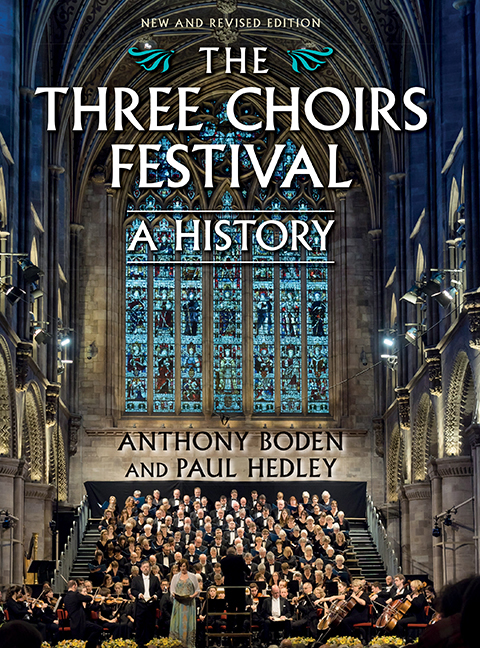Book contents
- Frontmatter
- Contents
- List of Illustrations
- Preface
- Acknowledgements
- List of Abbreviations
- List of Cathedral Organists
- 1 Origins
- 2 A Fortuitous and Friendly Proposal
- 3 A Numerous Appearance of Gentry
- 4 ‘The Musick of my Admiration Handel’
- 5 The Gentlemen and the Players
- 6 Avoiding Shipwreck
- 7 Prima voce
- 8 Favourites and Flops
- 9 Sacred and Profane
- 10 Froissart
- 11 The Unreasonable Man
- 12 The Dream
- 13 Beyond these Voices
- 14 An Essentially English Institution
- 15 The Elgar Festivals
- 16 Dona nobis pacem
- 17 Recovery
- 18 Association
- 19 A New Epoch
- 20 Jubilee
- 21 Theme with Variations
- 22 Houses of the Mind
- 23 ‘A Gold-Plated Orchestra’
- 24 A New Millennium
- 25 Reorganisation
- 26 An Invitation to the Palace
- Appendix Three Choirs Festival Timeline
- Select Bibliography
- Index
- Plate section
19 - A New Epoch
Published online by Cambridge University Press: 11 August 2017
- Frontmatter
- Contents
- List of Illustrations
- Preface
- Acknowledgements
- List of Abbreviations
- List of Cathedral Organists
- 1 Origins
- 2 A Fortuitous and Friendly Proposal
- 3 A Numerous Appearance of Gentry
- 4 ‘The Musick of my Admiration Handel’
- 5 The Gentlemen and the Players
- 6 Avoiding Shipwreck
- 7 Prima voce
- 8 Favourites and Flops
- 9 Sacred and Profane
- 10 Froissart
- 11 The Unreasonable Man
- 12 The Dream
- 13 Beyond these Voices
- 14 An Essentially English Institution
- 15 The Elgar Festivals
- 16 Dona nobis pacem
- 17 Recovery
- 18 Association
- 19 A New Epoch
- 20 Jubilee
- 21 Theme with Variations
- 22 Houses of the Mind
- 23 ‘A Gold-Plated Orchestra’
- 24 A New Millennium
- 25 Reorganisation
- 26 An Invitation to the Palace
- Appendix Three Choirs Festival Timeline
- Select Bibliography
- Index
- Plate section
Summary
Worcester 1966
When recalling impressions of the Opening Service, the one incident which looks biggest in retrospect is that Benjamin Britten's setting of the National Anthem was sung instead of the setting by Elgar, which has hitherto been heard at the opening of the festival for as long as most people can remember.
After hearing that modern setting of the familiar tune, which seemed – perhaps because of key affinity – to fall into place naturally and appropriately, as if it were born of the mood of trust and hope generated by Elgar's prelude to The Kingdom, a new epoch, I felt, had dawned upon the Three Choirs Festival: Christopher Robinson had made his mark!
CHRISTOPHER Robinson was born in 1936 at Peterborough and educated at St Michael's College, Tenbury, then at Rugby, and then Christ Church, Oxford. He was Assistant Organist at Christ Church from 1955 to 1958. During his last year at the university he was Assistant Organist at New College under Meredith Davies, and was then on the music staff at Oundle School for three years before taking the post of Assistant Organist at Worcester Cathedral in 1962. He succeeded Douglas Guest as Master of the Choristers and Organist in 1963, when he also became conductor of the City of Birmingham Choir in succession to Meredith Davies.
In 1966 Robinson brought to Three Choirs not only the impressive and grandiose Grande Messe des morts of Berlioz, but also, and long overdue, the music of Sir Michael Tippett in the year in which he was knighted: A Child of our Time, with Jennifer Vyvyan singing magnificently in the part of the Mother, and with Jean Allister, John Mitchinson and John Carol Case. At the Friday afternoon orchestral concert, Sir Adrian Boult conducted Tippett's Concerto for double string orchestra. There was also the first performance, commissioned by the National Federation of Music Societies, of Changes by Gordon Crosse. Described by the composer as ‘A Nocturnal Cycle for Soprano, Baritone, Chorus and Orchestra’, Changes is intended for large amateur choirs. The title refers to changes from day to night (symbolising life and death) and changes in bellringing, which provide many musical motifs of the work.
- Type
- Chapter
- Information
- The Three Choirs Festival: A HistoryNew and Revised Edition, pp. 254 - 268Publisher: Boydell & BrewerPrint publication year: 2017



